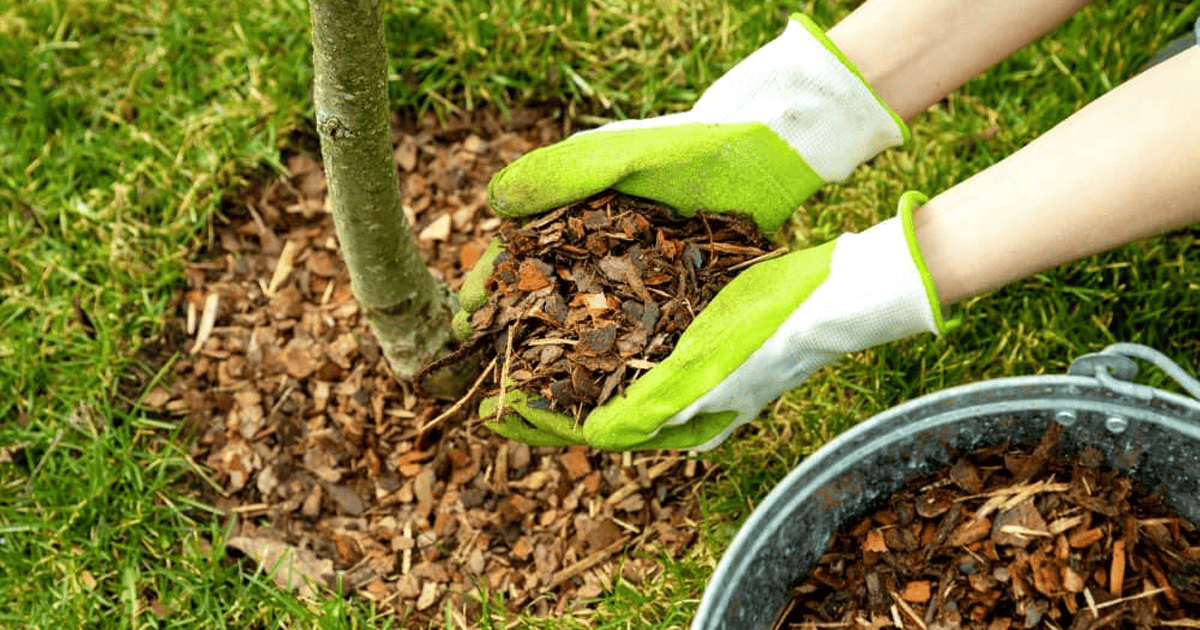Why Does Mulch Smell
Ever wondered why your mulch sometimes gives off a distinct, often unpleasant smell? You’re not alone. It’s a common question asked by gardeners and homeowners alike. This article’ll delve into the science behind that peculiar odor emanating from your mulch. We’ll explore why it might smell like manure, how this could potentially impact your health, and what measures you can take to prevent it.
Plus, we’ll discuss what good, healthy mulch should smell like. So let’s get down to the nitty-gritty of understanding the scent of your mulch – because there’s more to it than meets the eye (or rather, the nose).
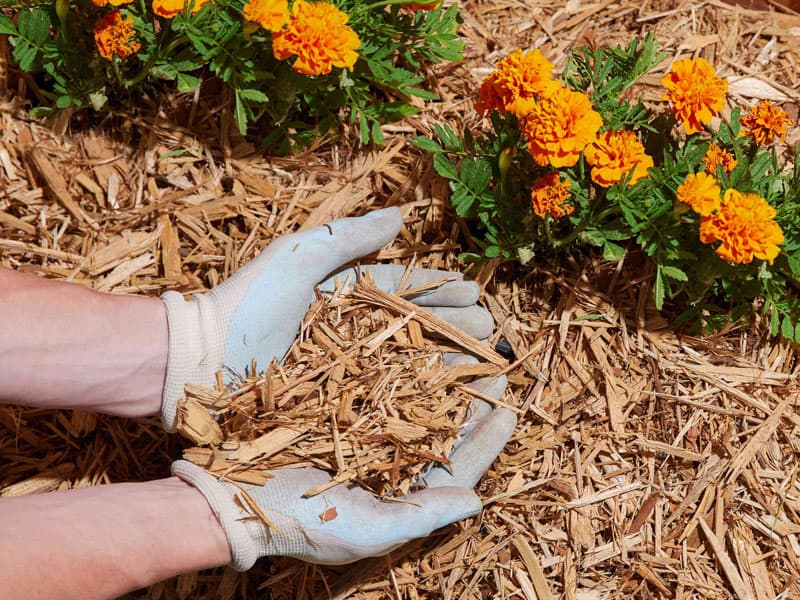
What Does Mulch Smell Like?
You’ve probably noticed the distinct smell of mulch in your garden, but have you ever wondered why it smells that way or how different types of mulch can vary in scent? Let’s delve into the typical aroma of mulch and discuss the specific scents associated with various kinds, from organic to rubber.
We’ll also explore the ‘sour mulch’ phenomenon and answer questions like ‘why does my mulch smell like poop?’, hinting at an intriguing interaction of elements. (Read Can I Mow The Lawn With A Pacemaker)
Identifying the Typical Smell of Mulch
Isn’t it fascinating that the typical smell of mulch comes from its natural decomposition process? Mulch is organic and as it breaks down, a distinct smell of mulch emerges. Identifying this scent involves noting a rich, earthy aroma. If your mulch smells bad, though, it could mean trouble. The type of materials the mulch is made from can influence the mulch’s smell.
So why does mulch smell? It’s all part of nature’s cycle!
Different Types of Mulch and Their Specific Smells
Digging into the gardening world, we’ll uncover a varied palette of fragrances across different types of ground coverings.
Cedar bark chips emanate a pleasant, woody scent.
Pine bark chips give off an earthy aroma.
Fresh grass clippings might have a strong, green smell.
Some mulch can smell bad if it’s decomposing poorly and may even smell like manure.
Remember, good mulch should smell like fresh-cut wood or compost.
Does Mulch Smell Bad? Unraveling the “Sour Mulch” Phenomenon
Have you ever noticed a foul stench from your garden, almost reminiscent of vinegar or sulfur? This sour mulch phenomenon may be because the mulch is stored without proper aeration. The breakdown of mulch results in it smelling like poop due to anaerobic bacteria. When produced improperly, mulch can produce odors akin to manure.
Avoid your mulch from smelling like manure by ensuring it’s well-aerated.
From Organic to Rubber Mulch: How Smells Can Vary
Exploring the world of garden covers, you’ll find that the aroma can vary greatly. From the earthy scent of organic compost to the odorless appeal of rubber chips.
Mulch that smells like manure may be because it is packed airtight, causing a build up of hydrogen sulfide. This smell can be off-putting but remember, this manure-smelling mulch often offers great benefits, improving overall quality of your garden soil.
Why Does Mulch Smell Like Poop: An Interaction of Elements
Transitioning from the varied smells of organic to rubber mulch, you might wonder why some mulch smells like poop. This manure-like smell in your mulch results from an interaction of elements: when it still smells like manure, it’s likely due to the presence of undecomposed manure in your mulch.
The odor can be intense, but there are ways to eliminate the smell. Beware though; there are dangers of breathing mulch with a strong odor.

Why Does Mulch Smell Like Manure?
Ever wondered why your mulch smells a lot like manure? To get a grasp of this, you’ll need to understand the process involved in making mulch and the science behind its decomposition.
The scent can be traced back to what the mulch is made from, often times it’s decaying organic matter which includes manure, and it’s the microorganisms that play a crucial role in breaking down these materials that give off that distinct smell. If you’re wondering specifically about your cypress mulch smelling like manure, we’ll delve into those details too. (Read When To Remove Straw Blanket From New Grass)
Understanding the Process: How Mulch is Made
To fully grasp why mulch has its distinct smell, it’s essential to understand how it’s made in the first place. Commercial mulch is packed with organic material, which upon decomposition can emit a potent odor. This scent may intensify days after mulch installation or if the mulch has gone bad.
Your choice of mulch will smell like the material it’s composed of, aiding in breaking down the mulch.
Decomposition: The Science Behind Mulch and its Manure-Like Smell
Transitioning from mulch production, let’s delve into the science behind its distinctive smell.
When watered, decomposition in mulch can produce an acrid ammonia odor.
If there’s a lack of oxygen, this breakdown leads to a buildup of hydrogen sulfide – making your mulch smell like rotten eggs.
This odor is actually due to bacteria decomposition and might be prevented by managing how you water the mulch.
Here’s what Mulch made from Manure Smells Like
You might wonder, what’s that distinct aroma wafting from manure-based compost? The smell is often indicative of decomposition as microbes break down mulch. This process causes the mulch to smell so bad.
When manure is in mulch, it intensifies this scent. Despite the odor, smelling mulch is the best way to gauge its healthiness for your garden. To prevent your mulch from smelling too intensely, you may need to remove the mulch periodically.
The Role of Microorganisms in Determining Mulch Smell
Let’s dive a bit deeper and shine a spotlight on those hardworking microorganisms that play an essential role in shaping the distinctive aroma of mulch. In the absence of oxygen, certain types of bacteria produce hydrogen sulfide gas, causing concentrations of hydrogen sulfide that can give off a foul odor.
Yet with plenty of oxygen, decomposition of mulch aids in healthy plant growth and spreads a more pleasant smell.
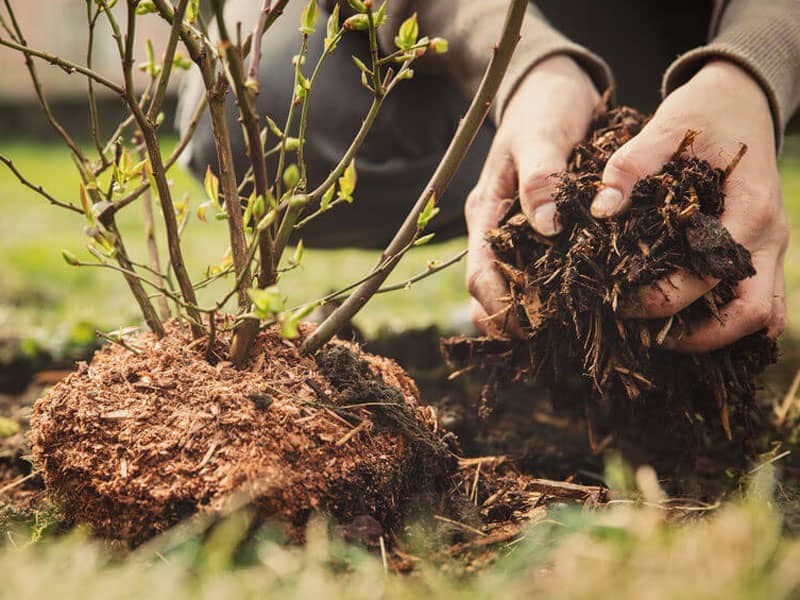
Getting Specific: Why Does My Cypress Mulch Smell Like Manure?
Shifting gears from microorganisms, let’s dive into your specific issue: why does your cypress mulch smell like manure? The application of wood mulch, especially cypress, better-smelling organic mulch often smells like the material it’s made from.
Compounds in mulch, particularly without plenty of air space and poor air circulation in days of mulch placement, aids in odor absorption. Mix your mulch with soil to improve air-flow.
Health Impact of Manure Smelling Mulch
You might be wondering about the hidden impacts of that foul mulch smell on your health. Understanding the potential dangers of sour-smelling mulch is crucial for ensuring your safety and comfort. Knowing how to handle smelly mulch properly is essential, recognizing when its odor becomes unbearable, and discern if this unpleasant smell could harm your health is essential.
The Hidden Effects of the Foul Smell of Mulch
Contrary to popular belief, the foul smell of mulch isn’t merely unpleasant but can also have hidden effects on both the environment and human health. This is especially true if the mulch is spread out on a tarp for days of installation without access to oxygen. The mix and spread process creates pockets of mulch in a dry, well-ventilated area, allowing the presence of an aroma similar to vinegar over some time. (Learn How To Get Rid Of Briars)
Understanding the Potential Dangers of Sour-Smelling Mulch
Understanding the potential dangers of sour-smelling mulch is crucial because it can pose serious environmental and human health threats. Days of mulch without sufficient oxygen can lead to compost over time. This compost can emit a range of bacteria and harmful chemicals, which can be detrimental to plants.
The combination of methane production and compression in sour-smelling mulch can disrupt the natural balance and result in the death of plants.
Is the Smell of Bad Mulch Harmful to Your Health?
Now that we’ve delved into the potential dangers of sour-smelling mulch, let’s turn our attention to whether this scent can be harmful to your health. When you get a batch of mulch and spread it around your garden, its purpose is to provide control of moisture and weeds, a bevy of nutrients, protection from drought damage and erosion.
However, if you notice an off-putting smell, changes in color, or blotches on leaves, it may indicate problems.
Safety Measures: How to Handle Smelly Mulch
To ensure your safety when dealing with pungent compost, there are several precautions you can take.
- Use pine bark mini nuggets, mixed bark mulch, or pine straw mulch as these types have less odor.
- Sugar cane mulch, when used in conjunction with regular mulch, is the best way to reduce smell.
- Always wear gloves and a mask when spreading your mulch.
Remember, like fresh compost, smell is a natural component in mulching.
The Fine Line: When the Smell of Mulch Becomes Unbearable
However, there’s a point when the scent of your compost becomes too overpowering to ignore, signaling that something might be wrong. An unbearable smell can indicate chromate copper arsenate presence or an improper material layer acting as a moisture barrier.
Over periods of time, this may lead to weed barrier fabric degradation and the browning of leaves. It’s crucial to rectify these issues promptly.
Preventing Your Mulch From Smelling Like Manure
To prevent your mulch from smelling like manure, there are several strategies you can follow:
- Choose the right mulch type: Some mulch, such as cedar or cypress, have natural properties that can help reduce odors. Avoid using mulch made from manure or other organic materials that may contribute to the smell.
- Spread the mulch evenly: Properly spreading it will prevent it from clumping together, which can lead to a build-up of moisture and odor. Use a rake or garden fork to distribute the mulch evenly and ensure good airflow.
- Use additives: Certain additives, such as lime or activated charcoal, can help neutralize odors in your mulch pile. Follow the instructions on the product label for proper application.
- Replace old mulch: Over time, mulch can break down and develop a foul smell. It’s important to regularly inspect your mulch and replace any that has become decomposed or has a strong odor.
By following these strategies, you can effectively prevent your mulch from smelling like manure and enjoy a pleasant garden or yard.
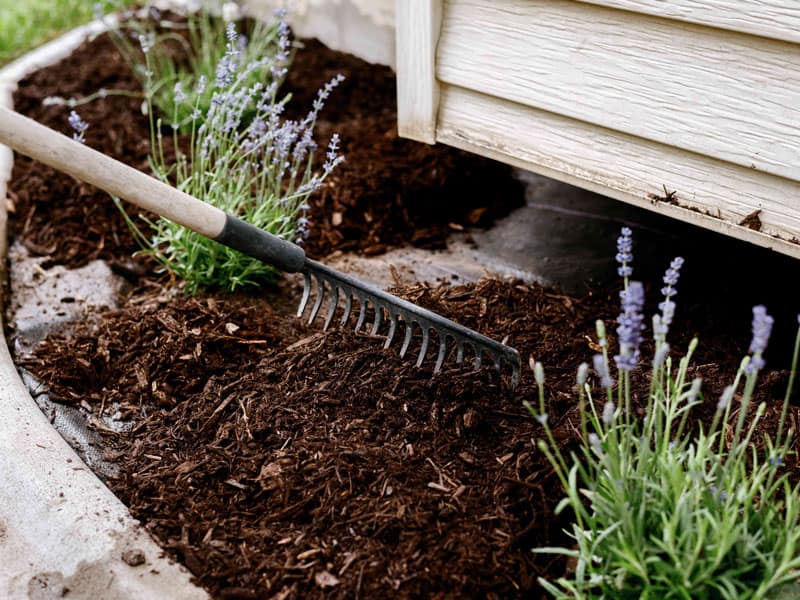
How To Get Rid Of The Smell in Mulch: Effective Solutions
You’re likely wondering how to effectively eliminate that unpleasant odor from your mulch, and several effective solutions are available.
Firstly, turn the mulch regularly to allow it to dry out – trapped moisture often causes foul odors.
Secondly, consider adding a layer of odor-absorbing material like activated charcoal or baking soda.
Lastly, replace old mulch with fresh, high-quality one periodically.
Choosing the Right Mulch: A Key Factor to Prevent Foul Odor
When preventing foul odors in your garden, choosing the right mulch is key. Opting for high-quality, well-composted mulch can help you navigate the odor issue. It’s crucial to know your materials. Organic mulches like wood chips, straw, or grass clippings are less likely to produce unpleasant smells than synthetic ones. Make an informed decision and keep those pungent scents at bay! (Learn How To Prevent Muddy Backyard)
Properly Spreading Your Mulch to Minimize Smell
Properly spreading your mulch can help minimize smell in your garden coverings. Mulch needs breathing space, so avoid creating a thick layer that traps moisture. This trapped moisture can become a breeding ground for bacteria and fungi, resulting in unpleasant odors. Aim for a three-inch depth when applying mulch.
In addition, it’s important to fluff up old mulch before adding fresh layers. This step improves air circulation, which helps prevent stink-causing decomposition. Following these steps can effectively minimize any unwanted odors from your garden mulch.
What To Add To Your Mulch Pile to Reduce Smell
Incorporating certain materials into your garden coverings can drastically reduce unpleasant odors.
Add brown compost elements like dry leaves, straw, or sawdust to balance out the green waste in your mulch pile. These components increase airflow and facilitate decomposition, reducing the chance of foul-smelling anaerobic bacteria forming.
Additionally, lime or calcium can neutralize acidic conditions that cause bad odor.
When to Replace Old Mulch to Avoid Bad Smell
Knowing when to swap out your old garden coverings can be a game changer in keeping those unpleasant odors at bay.
Start by observing the color – if it’s faded, it’s time for a replacement.
Also, check its texture. Crumbling quickly signifies degradation.
If you notice an off smell that doesn’t improve with turning or aerating, your mulch is likely past its prime and should be replaced to avoid further bad smells.
What Is Good Mulch Supposed to Smell Like?
Do you know what good mulch should smell like?
Let’s delve into the world of mulch odors.
We’ll identify both pleasant and unpleasant smells, compare expectations versus reality regarding the natural scent of mulch, and explore if black rubber mulch has a distinct aroma.
We’ll also uncover the true aromas emanating from commercial and colored mulches, and reveal what’s behind that vinegar-like smell often associated with certain types of mulch.
Identifying Pleasant and Unpleasant Smells from Mulch
You’ve probably noticed that mulch can have a variety of smells, some pleasant and others not. A healthy mulch often emits a sweet, earthy aroma indicative of its organic nature. But if it reeks like rotten eggs or ammonia, be wary. This foul smell signals anaerobic decomposition – indicating poor oxygenation and possibly harmful compounds being released.
What Natural Mulch Smells Like: Expectations vs. Reality
Imagine burying your nose into a pile of fresh, natural compost, expecting to be hit with an earthy aroma. Only to reel back from the unexpected stench of rot and decay. That’s reality vs. expectation when it comes to mulch smell.
Natural mulch may not exude the pleasant scent you’d expect because it comprises decaying organic material like leaves, bark, and wood chips that can produce foul odors over time.
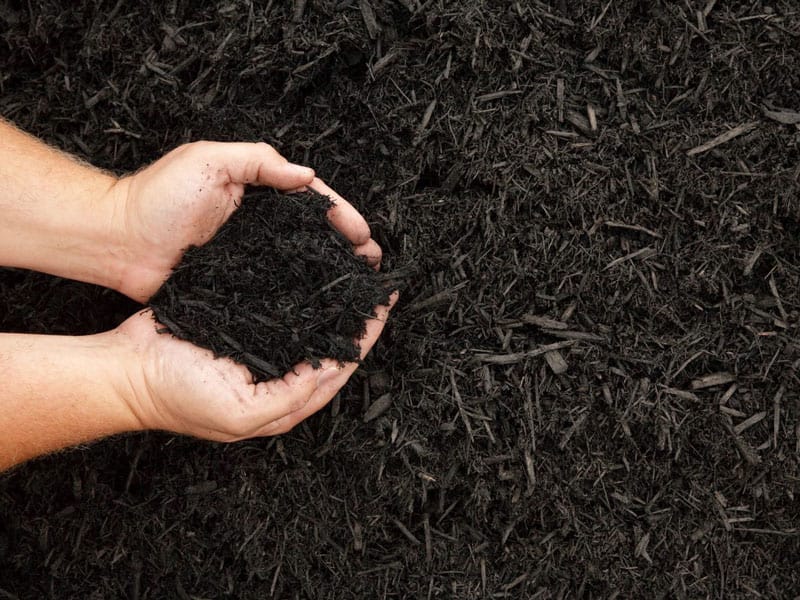
The Scent of Black Rubber Mulch: Is It Any Different?
Ever sniffed a bicycle tire or new pair of rubber boots? That’s exactly what you’d catch a whiff of when dealing with black rubber mulch. This smell is due to the volatile organic compounds (VOCs) released by the recycled tires used in its production.
While it may be off-putting to some, this scent doesn’t affect the mulch’s efficacy in preventing weed growth and retaining soil moisture.
Unveiling the True Smells of Commercial and Colored Mulch
Curious about what commercial and colored versions truly reek of? Let’s pull back the curtain and delve into the fascinating world of their distinctive aromas. Commercial mulch often smells like fresh-cut wood, while colored mulch carries a more chemical scent due to dyes used for coloring. The intensity varies based on the quality of dye and underlying wood type.
So, it’s not just brown stuff; each has a unique olfactory profile!
The Secret Behind the Vinegar-Like Smell in Mulch
If you’ve noticed a vinegar-like aroma wafting from your garden bed, it’s likely due to the fermentation process in the wood chips often used in landscaping. This process can produce acetic acid, a pungent smell similar to vinegar.
Additionally, anaerobic bacteria present in mulch can generate other organic acids contributing to this odor. It’s natural and doesn’t affect the quality of your mulch or soil health.
Conclusion
So, you’ve learned why mulch can smell like manure – it’s due to the decomposition process! Although it may not be pleasant, it’s usually harmless. However, if the odor is too strong or causes health issues, take steps to prevent it! Remember, good mulch should have a fresh, earthy smell. Understanding this will help you make informed choices about your gardening practices.

